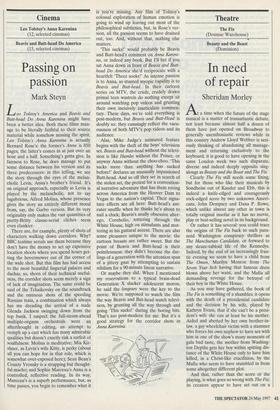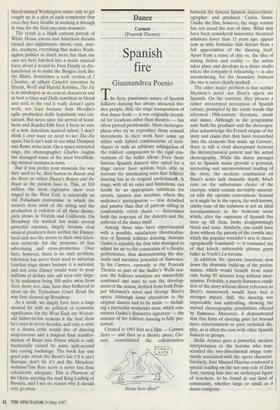Theatre
The Fix (Donmar Warehouse) Beauty and the Beast (Dominion)
In need of repair
Sheridan Morley
At a time when the future of the stage musical is a matter of transatlantic debate, not least because almost half a dozen of them have just opened on Broadway to generally unenthusiastic reviews while in this country Andrew Lloyd Webber is seri- ously thinking of abandoning all manage- ment and returning exclusively to the keyboard, it is good to have opening in the same London week two such disparate, diverse and indeed deeply opposite sing- alongs as Beauty and the Beast and The Fix.
Clearly The Fix still needs some fixing, but for those who like their musicals by Sondheim out of Kander and Ebb, this is indeed a knife-edged and courageously rock-edged score by two unknown Ameri- cans, John Dempsey and Dana P. Rowe, which unlike almost any other in town is totally original insofar as it has no movie, play or best-selling novel in its background.
Or rather it has several: you could trace the origins of The Fix back to such para- noid Washington conspiracy thrillers as The Manchurian Candidate, or forward to any sleaze-tabloid life of the Kennedys. Indeed, by the end of an increasingly fran- tic evening we seem to have a child from The Omen, Marilyn Monroe from The Seven Year Itch having that famous dress blown above her waist, and the Mafia all demanding revenge for the betrayal of their boy in the White House.
As you may have gathered, the book of The Fix is something of a shambles; it opens with the death of a presidential candidate and the decision by his wife, played by Kathryn Evans, that if she can't be a presi- dent's wife she can at least be his mother. Aided and abetted by her own brother-in- law, a gay wheelchair victim with a stammer who forces his own nephew to have sex with him in one of the show's many moments of gala bad taste, the mother from Washing- ton Depths gets her boy within spitting dis- tance of the White House only to have him killed, in a Christ-like crucifixion, by the Mafia who seem to have stumbled in from some altogether different plot.
And that, rather than the score or the playing, is what goes so wrong with The Fix; its creators appear to have set out on a blood-stained Washington satire only to get caught up in a plot of such complexity that even they have trouble in working it through in time for the final one-man massacre.
The result is a black cartoon parody of White House excess and American dreams turned into nightmares: incest, rape, mur- der, madness, everything that makes Wash- ington politics so much more fun than our own are here batched into a manic musical farce about a would-be First Family so dys- functional as to make the Borgias look like the Blairs. Sometimes a rock version of I Claudius, at others Camelot rewritten by Brecht, Weill and Harold Robbins, The Fix is as misshapen as its central characters and at best a Guys and Dolls rewritten in blood and acid; in the end it really doesn't quite work, not least because Sam Mendes's agile production drifts hopelessly into car- icature. But never since the arrival of Sond- heim and Kander/Ebb have I been so sure of a new American musical talent; I don't think I ever want or need to see The Fix again, but I can't wait to see what Dempsey and Rowe write next. On a space-restricted stage, the choreographer Charles Augins has managed some of the most breathtak- ing musical routines in town.
But if you prefer your musicals the way they used to be, then hasten to Beauty and the Beast or rather Disney's Beauty and the Beast as the posters have it. This, at $10 million the most expensive show ever staged in the West End, is essentially an old Palladium pantomime in which the scenery does most of the acting and the production is redolent of all those theme- park shows in Florida and California. On Broadway the musical has made several powerful enemies, largely because rival musical producers have neither the Disney- land cash nor the access to their own televi- sion networks for the purposes of free advertising and cross-promotion. Over here, however, there is no such problem; television has never been used to advertise London stage shows because it is national, and not even Disney would want to pour millions of dollars into ads seen very large- ly by audiences living 500 miles away from their show; nor, alas, have they bothered to clean up the Tottenham Court Road the way they cleaned up Broadway.
As a result, we simply have here a huge musical hit with no political or economic significance for the West End; my 90-year- old father-in-law reckons it the best show he's seen in seven decades, and only a cynic or a drama critic would tire of dancing soup-tureens and a magical final transfor- mation of Beast into Prince which is only fractionally ruined by some split-second late cueing backstage. The book has one good joke about the Beast's lair Cif it ain't Baroque don't fix it') and the Mencken/ Ashman/Tim Rice score is never less than relentlessly adequate. This is Phantom of the Opera meeting the mad King Ludwig of Bavaria, and I see no reason why it should ever go away.



























































 Previous page
Previous page